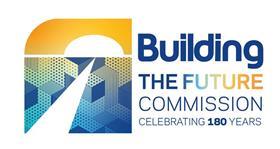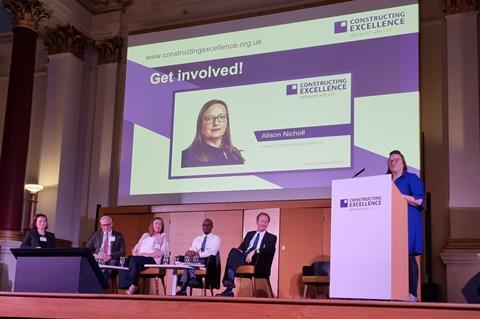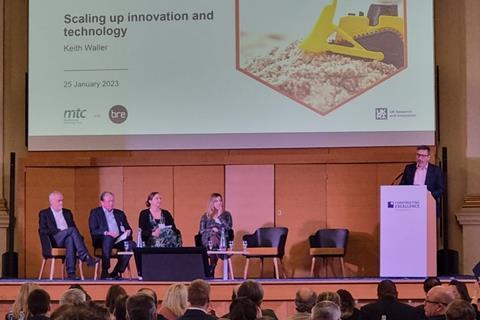A round-up of views from Constructing Excellence‚Äôs conference, part of the ∫⁄∂¥…Á«¯ the Future Commission‚Äôs search of industry-led solutions

A room full of construction’s great and good, all focused for the day on one challenge: “thriving through uncertainty”. Of course, it’s a challenge facing the whole economy, but for the purposes of this week’s the attention of the expert delegates was on what contribution they and their organisations can make to improving the nation’s fortunes.
The mood was far from gloomy. Panellists and attendees looked back at the covid years and acknowledged how the industry came together like never before, managing to keep working – albeit at times with reduced productivity – and avoid mass redundancies. There was a desire at the conference to build on that collective experience in order to fundamentally transform the sector, embracing digitisation, collaboration and a new generation of young talent.
In his opening speech, Richard Robinson, the Construction Leadership Council deputy co-chair, set out the organisation’s new priorities: building safety, net zero, people and skills, and “next generation” delivery.
Meanwhile Alison Nicholl, head of Constructing Excellence, urged people to get involved with the organisation‚Äôs projects for the coming year, welcoming the launch of a series of regional roundtables run in partnership with ∫⁄∂¥…Á«¯ as part of the ∫⁄∂¥…Á«¯ the Future Commission, which Nicholl described as a ‚Äúfantastic piece of work‚Äù.

Do better things, not the same things better
WSP’s head of innovation, Dale Sinclair, set out the difference between change, which he described as “optimised tradition”, and disruption, defined as a paradigm shift. He said that if the construction industry wanted to get the best out of innovative technologies, it needed to focus on the latter. “Why are we not getting optimised productivity,” he asked. “It’s because we are taking these technologies and laying them into traditional methods so they are sub optimal”.
We need to ask ‘Am I trying to become a better Blockbuster or a disruptive Netflix?’
Keith Waller, Construction Innovation Hub
Keith Waller, programme director at the Construction Innovation Hub, agreed, saying that the industry needs “strategic change that does a better thing, not the same thing better” and urging firms to ask: “Am I trying to become a better Blockbuster or a disruptive Netflix?”

At the “thriving commercially” panel later in the day, the group discussed how typical contracting practices could be an obstacle to this more disruptive activity, noting that innovative construction techniques could only be adopted if contractors were involved in the design process from an early stage.
Scott Tacchi, head of MMC at Sir Robert McAlpine, said up to 80% of projects that come to his firm are already at RIBA Stage 3 or beyond, limiting the scope for innovation and change. In his eyes, this meant that clients were essentially “throwing their own money away”.
Speaking from his previous experience as the head of the Department for Education’s MMC programme, he said innovative construction projects were most successful when contractors move away from a “continual race to the bottom and work with the supply chain to remove waste”. While he said that a few contractors – name-checking Wates and Bowmer & Kirkland had “nailed” the collaborative approach – but that in many cases people were “still rushing to the lowest quote”.
Professor David Mosey highlighted the government‚Äôs failure in this respect, pointing out its decision to shoot down Lord Aberdare‚Äôs proposed amendment to the ∫⁄∂¥…Á«¯ Safety Act, which aimed to push back against adversarial contracting by creating a process for the regulator to highlight the potential safety impacts of inappropriate contract terms.
Make respect and inclusion part of the industry’s DNA
Solving the industry’s skills shortage was another major focus of the day, with speakers focusing on the challenges faced in attracting young people into the industry. “We need to think ‘what is our image’ when we talk about the built environment,” said Turner & Townsend cost manager Sesitwa Mohlala, who explained that the industry’s fragmentation meant most young people were not aware of the range of careers open to them in construction. “We have got so many roles which could be a beautiful thing or a curse,” he said.
We need to think ‘what is our image’ when we talk about the built environment
Sesitwa Mohlala, Turner & Townsend
Lydia McGuinness, a Wates site manager and Generation for Change national chair, gave a passionate speech about her work in construction, but highlighted some of the off-putting attitudes that she had come across on site. She highlighted some of the sexist comments she had been subjected to at work, which included: “why don’t you go back to the kitchen and make Yorkshire puddings” and “why are you bothering, you can’t have kids and be on site”. She said that while not everyone’s mind could be changed, it is possible – and necessary if the industry is to retain young and diverse talents on site – to change workplace culture by better educating managers.
Tracey Collins, Kier’s head of diversity & inclusion, agreed, saying that the problem was that many do not know how to call out an issue related to diversity and inclusion. She said she wanted workers at Kier to treat intolerance and disrespect on site in the same way they would treat a safety incident. “We want to make respect and inclusion part of our DNA,” she said.
Mohlala made a similar point, stating that people at the conference needed to go back to their boards and ask for a change in culture. “The rest follows from that,” he said. “It needs to be a part of our identity not just a tick box to try to get work”.
Never waste a good crisis
With the pandemic barely in the rear-view mirror, the industry is set for another rocky period with a protracted recession expected. But panellists were keen to emphasise the positive side of this instability, with T&T’s Mohlala reminding the audience of the old saying – and title of a 2009 Constructing Excellence report – that one should “never waste a good crisis”.
A number of panellists explained what they were doing to make the most of the present crisis. Waller pointed to experiments happening in the Construction Innovation Hub calls “sandpits”, a term that refers to in Coventry that provide spaces to refine innovative products and solutions in a “fail fast” learning environment. Kier’s Collins set out her firm’s work on improving its workplace policies relating to paternity, paternity and menopause.
∫⁄∂¥…Á«¯ the Future Commission
The ∫⁄∂¥…Á«¯ the Future Commission is a year-long project, launched to mark ∫⁄∂¥…Á«¯‚Äôs 180th anniversary, to assess potential solutions and radical new ways of thinking to improve the built environment.
The major project’s work will be guided by a panel of 19 major figures who have signed up to help guide the commission’s work culminatuing culminate in a report published at the end of the year.
The project is looking at proposals for change in eight areas:
- Skills and education
- Energy and net zero
- Housing and planning
- Infrastructure
- ∫⁄∂¥…Á«¯ safety
- Project delivery and digital
- Workplace culture and leadership
- Creating communities
∫⁄∂¥…Á«¯ the Future will also undertake a countrywide tour of roundtable discussions with experts around the regions as part of a consultation programme in partnership with the regional arms of industry body Constructing Excellence.
>> Email buildingfuturecommission@building.co.uk to get in touch



























No comments yet